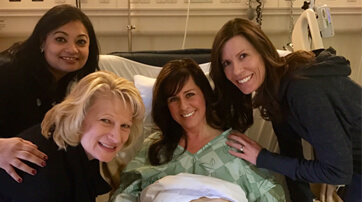More than 118,000 People Waiting for an Organ Transplant
April is National Donate Life Month (NDLM). It is a month to honor solid organ donors and donor families, recognize the selflessness of registered donors and thank them for giving hope to others, and to call attention to the many patients on transplant lists who continue to wait.Transplantation is one of the most remarkable stories in modern medicine. It offers sick people whose own organs are failing them an opportunity to live a healthy, productive and normal life. Organ transplantation returns people to their families, friends and communities. In 2016, more than 33,600 transplants brought renewed life to patients and their families and communities (from 9,900 deceased and 5,900 living donors).But sadly, 8,000 people die each year (22 people each day) in the United States because the need for organs far exceeds the current available supply. There are currently 118,000 men, women and children on the national transplant waiting list and that number continues to grow steadily, while the number of donors and transplants only grows slowly.
A Need for Registered Organ Donors
While the vast majority of Americans support donation as an opportunity to give live and help others, only 54 percent of the U.S. adult population is registered as an organ, eye and/or tissue donor. There is a great need for increased registration as well as consideration for living donation. One person has the potential to donate up to eight lifesaving organs, corneas to help 2 others and tissue for up to 75 others. People of all ages and medical histories should consider themselves potential donors.Unfortunately, many also overlook the important step of registering as a donor. Many organ donations are from people who have died unexpectedly due to an accident or health condition, and their wishes to donate may or may not be known to their families. For people who are not registered donors, their families are faced with making decisions about donation at a time of sudden shock, extreme sadness and grief. Registering as an organ donor is not only a gift to the recipient of the organ(s), but also to the donor’s family, as it relieves them from the burden of making such a decision at a very difficult time and ensures that their loved one’s wishes are honored, so consider registering for organ donation today.

Quest Diagnostics colleagues visit Kelley Bundick in the hospital shortly after her organ donation to a complete stranger. Shown are (left to right) Rekha Shankar, Mary Smith, Kelley Bundick and Ann Lynch.Quest Diagnostics is a leading provider of diagnostic information services to support transplantation patients. Transplantation patients require long-term care, and Quest provides testing to aid all stages of this journey. The company’s services range from testing to help confirm potential matches to services to aid the selection immunosuppressive therapy and provide long-term monitoring of transplant recipients.In addition to supporting patients and donors throughout the transplantation process, Quest employees also recognize the importance of organ donation as well. Some Quest employees have even been donors themselves.
Kelley Bundick, for instance, recently donated her kidney to a girl with lupus.To learn more about organ, eye, tissue and living donation, visit
DonateLife.net. To register your decision to save and heal lives, visit
RegisterMe.org.
Your Privacy Choices





